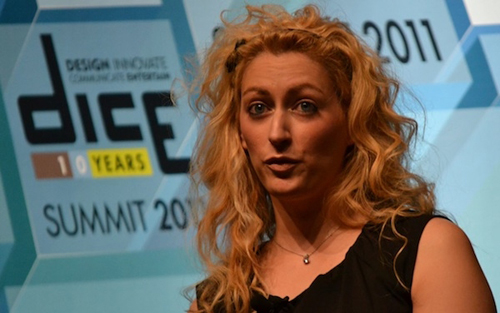2011年DICE峰会观点:游戏可对现实生活产生积极影响
作家兼未来主义者简·麦格尼格尔(Jane McGonigal)在上周五于拉斯维加斯举行的2011年DICE峰会上表示,当互动娱乐元素持续在主流社会获得巨大发展时,电子游戏及其玩家却仍然受到无端指责。
她认为,游戏是一个足以改变社会的强大媒介,游戏设计师们必须深刻认识这一点。玩家们并不懒惰,他们在玩电子游戏的同时,其实也体验了许多正面效应,例如增强自信心、动力以及积极压力等,“游戏是值得我们花时间去做的最有效率的事情…它们能赋予我们改变世界的力量。”
游戏邦获悉,她目前在未来学会(Institute for the Future)主持游戏研究与开发工作,并著有《破碎的现实:游戏何以改变世界》(Reality Is Broken: Why Games Make Us Better and How They Can Change the World)一书,还曾在去年的TED大会上就电子游戏及其产生的正面影响发表了自己的看法。
她希望能够扭转人们对游戏是在浪费时间的这一错误观念,并认为这种看法是这个产业发展最大的障碍之一。
麦格尼格尔列举了几个能够展示游戏积极效应的研究例证,例如,游戏能够减轻士兵创伤后的压力综合症,不少人在玩过《摇滚乐队》(Rock Band)后对真实乐器产生了更浓厚的兴趣,玩家在虚拟世界的成功也能增强其现实生活的自信心。
她认为,“在游戏中的良好感觉完全可以转移到现实世界,这并不是一个疯狂的想法。我们的思维模式以及真实的生活方式都可以因游戏而改变。”据游戏邦了解,她还驳斥了游戏是逃避现实的手段这一大众观点,“我认为这是一个十分危险的想法……玩游戏可以让我们积极参与而不是逃避现实生活。”
最近宣布加盟新游戏工作室Social Chocolate的麦格尼格尔还表示,人们每周花在玩游戏上的时间为30亿小时,她希望在下个十年结束时,能将这个数字提升至210亿小时。
她表示,当玩家在游戏时,他们可以体验“积极压力状态”,人们处于良性刺激状态的活力和乐观精神,可以让我们变得更加可爱,这是一种非凡的心态。
“从游戏中得到的积极情绪可以延伸至人们的现实生活,”她补充道,“我们的游戏就像咬了彼得·帕克(Peter Parker,《蜘蛛侠》主角)的放射性蜘蛛,能够赋予人们新的能量。”游戏具有提供积极情绪、健康的人际关系以及成就感的能力。
据麦格尼格尔所言,游戏是一个强大的媒介,虽然它能够对玩家的现实生活产生显著的积极影响,但若想让游戏对现实世界产生更大的作用,游戏设计师们仍然是任重道远。
她表示,他们正在做一项艰难的工作——赋予游戏新的内涵,希望可以看一看自己将如何改变玩家的现实生活,通过游戏引导玩家积极面对现实世界。(本文为游戏邦 /gamerboom.com编译,转载请注明来源:游戏邦)
DICE 2011: Futurist McGonigal Says Gaming ‘Single Most Productive’ Way To Spend Time
Even as interactive entertainment continues to proliferate throughout mainstream society, video games and people who play them still get a bad rap, according to author and futurist Jane McGonigal, who spoke at the 2011 DICE Summit in Las Vegas on Friday.
Games are a powerful medium that can change society, and game designers need to recognize this more, she said. Gamers are not lazy, and when they’re playing video games, they’re actually experiencing a wide range of positive side effects such as increased confidence, motivation and positive stress, McGonigal said.
“Games are the single most productive thing we can do with our time … [they] give us the power to change the world,” she said.
McGonigal, who’s director of game research and development at the Institute for the Future, wrote the book Reality Is Broken: Why Games Make Us Better and How They Can Change the World. She also spoke at the non-profit TED conference last year about video games and positive change.
She said she wants to “reverse the common misconception that games are a waste of time. … This is one of the biggest obstacles for industry growth,” she said.
McGonigal offered examples of research that showed positive side effects of gaming, such as a lessening of post-traumatic stress disorder in soldiers, increased interest in playing real musical instruments after playing games like Rock Band, and a sustained boost in real-life confidence after successful virtual conquests.
“Feeling good in a game does transfer to real life. … It’s not a crazy idea,” she said. “Games are changing the way we think and how we spend our real lives.” McGonigal also argued against the common notion that games are about escapism. “I think this is a very dangerous idea. … We are powering up our real lives when we play them,” not escaping.
McGonigal, who recently announced that she signed on with the new game studio Social Chocolate, said people are spending 3 billion hours a week playing games. She wants to up that to 21 billion hours by the end of the decade.
Gamers experience “a state of positive stress,” when they play, she said. “When we are in a state of eustress, people like us more – we’re more likable because we have this energy and this optimism. … This is an extraordinary state of mind to be in.”
“The positive emotions that we get from games are spilling over into real life,” she added. “Our games are like the radioactive spider that bit Peter Parker. They’re giving people new powers.” Games, she said, have the ability to provide positive emotion, strong relationships, meaning and a sense of accomplishment.
While games are a powerful medium that, according to McGonigal, have striking positive side effects on players that spill over into real life, there is still a lot that game designers must do if games are to make sweeping changes to the real world.
“We’re doing a horrible job of putting meaning into games,” she said. “I hope we’re taking a look at how we can change [gamers'] real lives as well. … We have to bring our gamer selves into the real world.” (source:gamasutra)









































